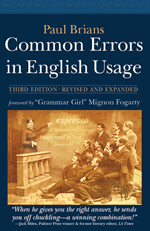First let’s all join in a hearty curse of the grammarians who inserted the wretched apostrophe into possessives in the first place. It may well have been a mistake. In Medieval English possessive nouns ended with an -ES or -YS. Eventually the vowel before the S disappeared, and we were left with forms like “Johns hat.” Some 17th-century writers took the result to be an abbreviation and decided that the simple “s” of possession in a phrase like “Johns hat” must have been formed out of a contraction of the more “proper” “John his hat.” One theory is that since in English we mark contractions with an apostrophe, some scholars did so, and we were stuck with “John’s hat.” Their purported error can be a handy reminder: if you’re not sure whether a noun ending in S should be followed by an apostrophe, ask yourself whether you could plausibly substitute “his” or “her” for the S.
The exception to this pattern involves personal pronouns indicating possession like “his,” “hers,” and “its.” For more on this point, see “its/it’s.”
Get this straight once and for all: when the S is added to a word simply to make it a plural, no apostrophe is used (except in expressions where letters or numerals are treated like words, like “mind your P’s and Q’s” and “learn your ABC’s”).
Apostrophes are also used to indicate omitted letters in real contractions: “do not” becomes “don’t.”
Why can’t we all agree to do away with the wretched apostrophe? Because its two uses—contraction and possession—have people so thoroughly confused that they are always putting in apostrophes where they don’t belong, in simple plurals (“cucumber’s for sale”) and family names when they are referred to collectively (“the Smith’s”).
The practice of putting improper apostrophes in family names on signs in front yards is an endless source of confusion. “The Brown’s” is just plain wrong. (If you wanted to suggest “the residence of the Browns” you would have to write “The Browns’,” with the apostrophe after the S, which is there to indicate a plural number, not as an indication of possession.) If you simply want to indicate that a family named Brown lives here, the sign out front should read simply “The Browns.” When a name ends in an S you need to add an ES to make it plural: “The Adamses.”
No apostrophes for simple plural names or names ending in S, OK? I get irritated when people address me as “Mr. Brian’s.”
What about when plural names are used to indicate possession? “The Browns’ cat” is standard (the second S is “understood”), though some prefer “the Browns’s cat.” The pattern is the same with names ending in S: “the Adamses’ cat” or—theoretically—“the Adamses’s cat.”. However, because these standard forms can seem awkward, “the Adams’ cat” is widely accepted, with one S indicating both plural number and possession.
Apostrophes are often mistakenly omitted in common expressions such as ”at arm’s length” and “at wits’ end.” Note that the position of the apostrophe before or after the S depends on whether the word is a plural form ending in S. You hold someone at the length of your arm (singular), but are at the end of your wits (plural).
Other examples: “the people’s choice,” “for old times’ sake,” and “for heaven’s sake.” Why is the place name in England “Land’s End” but the American corporation “Lands’ End”? It was just a mistake, and now the company is stuck with its misplaced apostrophe.
Apostrophes are also misplaced in common plural nouns on signs: “Restrooms are for customer’s use only.” Who is this privileged customer to deserve a private bathroom? The sign should read “for customers’ use.”
For ordinary nouns, the pattern for adding an apostrophe to express possession is straightforward. For singular nouns, add an apostrophe plus an S: “the duck’s bill.” If the singular noun happens to end in one S or even two, you still just add an apostrophe and an S: “the boss’s desk.”
For plural nouns which end in S, however, add only the apostrophe: “the ducks’ bills.” But if a plural noun does not end in S, then you follow the same pattern as for singular nouns by adding an apostrophe and an S: “the children’s menu.”
In names which end in S the possessive plural is usually formed by simply adding an apostrophe: “the Joneses’ house” It’s most often “in Jesus’ name.” “In Jesus’s name” is acceptable, but those three syllables ending in S next to each other sound awkward.
It is not uncommon to see the “S” wrongly apostrophized even in verbs, as in the mistaken “He complain’s a lot.”
Unfortunately, some character sets do not include proper curled apostrophes, including basic HTML and ASCII. If you do not turn off the “smart quotes” feature in your word processor, the result will be ugly gibberish in your writing which will make it hard to read.
But if you wish to create a true apostrophe in HTML [’] instead of a straight “foot mark” [‘], you can write this code: ’.
Another problem involving smart quotes arises when you need to begin a word with an apostrophe, as in “the roaring ’20s” or “give ’em a break.” Smart quotes will curl those opening apostrophes the wrong way.
There’s more than one way to solve this problem, but here are the easiest ones in Microsoft Word: 1) for Windows users, hold down the CTRL key and hit the apostrophe key twice, 2) for Mac users, hold down the option and shift keys and hit the right square bracket key. If all else fails, you can type a pair of single quotation marks and delete the first one.
See also “acronyms and apostrophes.”
Listen to Paul Brians discuss apostrophes on his Common Errors in English Usage Podcast.
Part 1 | Part 2 | Part 3
Back to list of errors

BUY THE BOOK!
